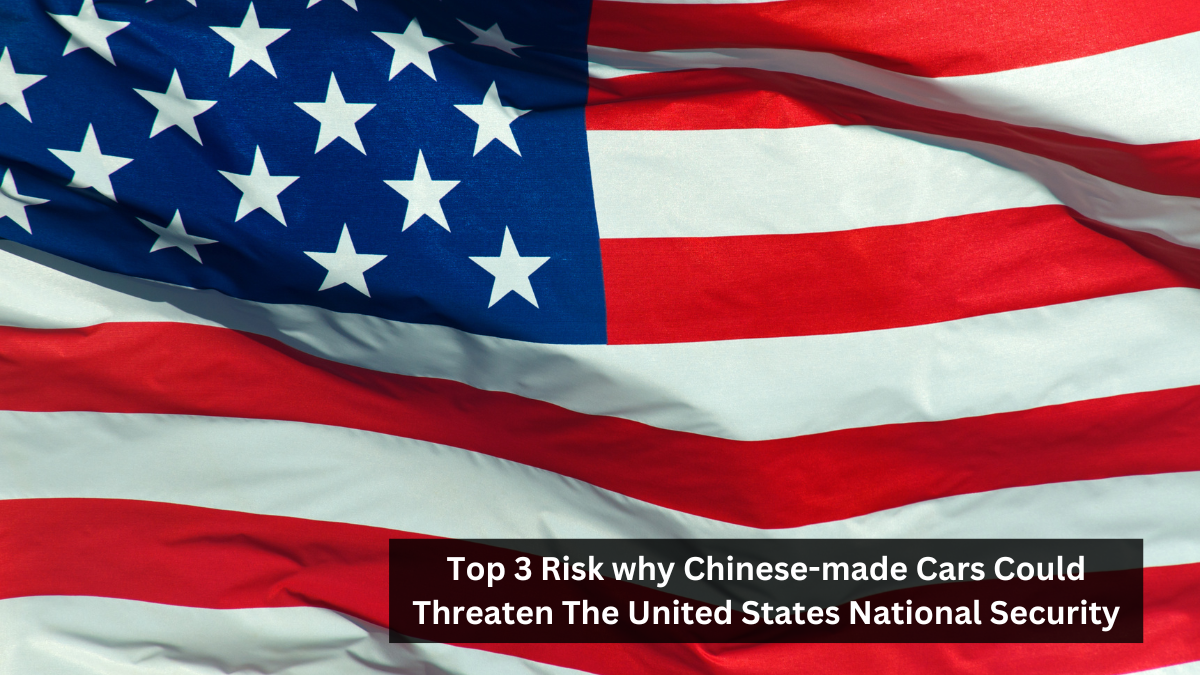Similar to smartphones, linked cars have the potential to gather enormous volumes of personal data and are subject to hacking. How significant are the risks? Modern connected cars are vulnerable to hacking and gather a lot of personal data, which puts privacy and security at risk.
Why Chinese made cars could threaten U.S. national security
In response to national security concerns, the United States intends to outlaw the use of Chinese software, hardware, and internet-connected automobiles.

Mass surveillance, espionage, and sabotage are among the risks. Cars may be utilized as surveillance tools or as targets for manipulation.
These days, cars are computers that are always connected to the internet, not merely equipment that are mounted on wheels. Although they can carry humans, these “smart” cars are capable of much more. They monitor their environment, overhear conversations within the home, and keep tabs on important locations and connections in our life. Now that bidirectional charging is available, electric cars are even developing into grid-supplied batteries.
Also Read – Self-Driving Cars! What to Expect Today, Tomorrow, and in the Future
These developments carry a significant danger. Because of their enormous data collection capacities and hacker susceptibility, connected cars pose significant privacy risks. Cars and smartphones are beginning to resemble one other in many aspects, as smartphones have become essential to our digital lifestyle. Nevertheless, unlike cellphones, cars can be used as sabotage tools, which adds a concerning level of risk to the security issue.
The American government is acting to reduce these hazards in response. There are plans to outlaw the importation of linked cars from China. More generally, China and Russia are at the top of the US government’s list of “countries of concern,” from which any auto software or parts are intended to be banned.
Washington claims that Chinese manufacturers represent a serious threat to the US and its citizens, which is why these steps are justified on the basis of national security. However, in which particular situations may this threat manifest itself? Furthermore, how grounded are they? An outline of the dangers and their possible effects is provided below.
First risk: widespread surveillance
Modern cars track where a vehicle is at all times, which generates enormous volumes of data, especially position data. You may infer a lot about the driver from this, including their residence, place of employment, business associates, and even private information like travel schedules or extramarital affairs.
Personal data is accessed by automakers.
Automakers may obtain a great deal of behavioral intelligence from their customers, much like advertisers and data brokers can from tracking the movements of smartphones.
Installed apps and integrated infotainment systems in cars also collect extra data. But when drivers link their smartphones and use Google Maps for navigation or hands-free calls, that’s when the real convenience happens. However, there is a price for this convenience: giving the car access to personal information.

Modern automobiles come with a wide range of sensors. Particularly sensitive are in-car microphones, which are frequently utilized for private or professional discussions. Additionally, cameras—inside and out—are becoming more and more commonplace.
This information is regularly gathered by automakers, and not just Chinese companies do so. According to a 2023 Mozilla Foundation analysis on automotive brand practices, contemporary autos are a privacy nightmare.
But because of geopolitical tensions, the US perceives Chinese firms as posing a special threat. Countries that produce vehicles, such as Germany, Japan, and South Korea, had little incentive to utilize the data that cars gather, according to a report published as early as 2021 by the American Center for Strategic and International Studies (CSIS). “But things are different in China.”
Also Read – 16 Cutting-Edge Vehicles You`ll See by 2030
Beijing’s potential access to this data through Chinese automakers is a cause for alarm. China’s interest in mass data collecting is well-documented, and the country’s government is believed to have been responsible for multiple significant cyberattacks that exposed millions of Americans’ personal data . These endeavors would benefit greatly from the addition of data from connected automobiles.
Such large data collections could be used by a state for counterespionage or espionage. Intelligence agencies might develop a comprehensive «shadow CV» to follow possible spies or targets by integrating data from various sources. Blackmail could also be used as a weapon with this information.
American officials are aware of this possibility. Vehicle data is specifically mentioned as being helpful to adversarial intelligence services in the national counterintelligence policy that was unveiled last summer. Data protection now becomes a national security issue in this situation.
Second Risk: Espionage
Networked cars are excellent for surveillance as well, whether the goal is to watch people or particular areas. Many people see cars as discreet places where people can have private chats. With integrated microphones, though, that presumption is no longer valid.
These cars can act as entry points for listening in. Depending on the smartphone connection, this could also apply to emails and text messages in addition to phone conversations. It is also possible to exploit the infotainment system of a car to install spyware on the driver’s phone.
Vehicle data makes it possible to follow an individual’s travels. Internal cameras or driving behavior analytics may be able to provide information about the emotional state of the driver in specific situations.
Spying can also benefit from the usage of external cameras. They are able to obtain data regarding corporate buildings, military installations’ security protocols, and other vehicles and people in restricted areas.
In protected areas, cars essentially turn into mobile surveillance cameras. China is aware of this risk already. Beijing is preparing to outlaw private Tesla vehicles from specific administrative zones and limited the use of Tesla vehicles for state-owned company employees, government servants, and members of the armed forces in 2021.
But Chinese-made automobiles are not the only thing that the US views as a security risk. Software and parts that link cars to the outside world via Bluetooth, Wi-Fi, cellular networks, or satellites would be covered by the proposed prohibition. This may have an impact on automobiles made by American or European automakers, many of whom get their component parts from China. Well-known manufacturers like Mercedes and BMW even build whole cars in China for export.
Third Risk: Sabotage
Connected cars carry a real risk of sabotage in addition to the possibility of spying. Hackers have already controlled automobiles remotely in several instances, even turning off their motors while driving on public roads. Automobile manufacturers usually have remote access to vital components, even though external actors still find such attacks expensive and difficult to execute. For example, Tesla regularly upgrades the software in its cars online.
There are serious concerns associated with being able to operate a car’s controls, especially in driverless vehicles. It is possible that a government such as the one in China could plan to remotely trigger a deadly accident in order to attack a dissident. It would probably be challenging to prove that such an attack was not just a routine crash but rather a hidden killing.
Autos with constant internet connectivity are more vulnerable to sabotage.
One can also escalate vehicle sabotage. Hundreds or even thousands of cars in an area could be rendered immobile at the same time, crippling emergency services and causing traffic jams in place of a single car. Even though such an operation would be noticeable, it might be used during an open combat or as a component of a larger strike.
The electrical grid is also at risk from electric automobiles. Variations in the electrical supply could result from thousands of automobiles charging at once. There are even more ways for automobiles to cause power outages when they are equipped with bidirectional charging, which turns them into batteries that pump energy back into the system.
U.S. authorities have made it clear that linked cars might be used to threaten vital infrastructure, including as the electrical grid, in conjunction with the impending ban.
Conclusion
Many people might find the American plans extreme and the threats unfounded. There aren’t many Chinese cars on American roads right now, yet there are a variety of situations in which they can jeopardize national security. However, there are dangers.
The United States’ efforts to suppress networked cars are consistent with its larger position regarding Chinese technology. For a while now, the US has been exerting more pressure on Chinese goods—from Huawei to TikTok—using justifications related to industrial policy, national security, and geopolitical objectives.
Now that linked cars are a part of the technical competition between China and the United States, European automakers will probably be affected. It might be necessary for those who want to stay in business in the US to cut back on or break off relationships with Chinese suppliers.




